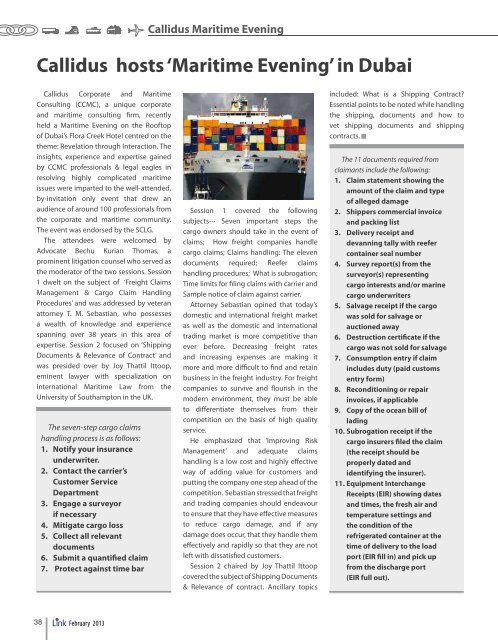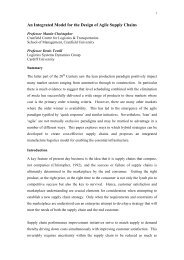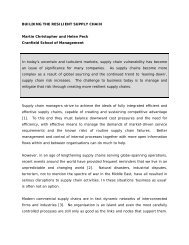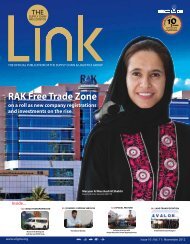Material Handling Equipment Material Handling Equipment - SCLG
Material Handling Equipment Material Handling Equipment - SCLG
Material Handling Equipment Material Handling Equipment - SCLG
Create successful ePaper yourself
Turn your PDF publications into a flip-book with our unique Google optimized e-Paper software.
Callidus Maritime Evening<br />
Callidus hosts ‘Maritime Evening’ in Dubai<br />
Callidus Corporate and Maritime<br />
Consulting (CCMC), a unique corporate<br />
and maritime consulting firm, recently<br />
held a Maritime Evening on the Rooftop<br />
of Dubai’s Flora Creek Hotel centred on the<br />
theme: Revelation through Interaction. The<br />
insights, experience and expertise gained<br />
by CCMC professionals & legal eagles in<br />
resolving highly complicated maritime<br />
issues were imparted to the well-attended,<br />
by-invitation only event that drew an<br />
audience of around 100 professionals from<br />
the corporate and maritime community.<br />
The event was endorsed by the <strong>SCLG</strong>.<br />
The attendees were welcomed by<br />
Advocate Bechu Kurian Thomas, a<br />
prominent litigation counsel who served as<br />
the moderator of the two sessions. Session<br />
1 dwelt on the subject of ‘Freight Claims<br />
Management & Cargo Claim <strong>Handling</strong><br />
Procedures’ and was addressed by veteran<br />
attorney T. M. Sebastian, who possesses<br />
a wealth of knowledge and experience<br />
spanning over 38 years in this area of<br />
expertise. Session 2 focused on ‘Shipping<br />
Documents & Relevance of Contract’ and<br />
was presided over by Joy Thattil Ittoop,<br />
eminent lawyer with specialization on<br />
International Maritime Law from the<br />
University of Southampton in the UK.<br />
The seven-step cargo claims<br />
handling process is as follows:<br />
1. Notify your insurance<br />
underwriter.<br />
2. Contact the carrier’s<br />
Customer Service<br />
Department<br />
3. Engage a surveyor<br />
if necessary<br />
4. Mitigate cargo loss<br />
5. Collect all relevant<br />
documents<br />
6. Submit a quantified claim<br />
7. Protect against time bar<br />
Session 1 covered the following<br />
subjects--· Seven important steps the<br />
cargo owners should take in the event of<br />
claims; How freight companies handle<br />
cargo claims; Claims handling: The eleven<br />
documents required; Reefer claims<br />
handling procedures; What is subrogation;<br />
Time limits for filing claims with carrier and<br />
Sample notice of claim against carrier.<br />
Attorney Sebastian opined that today’s<br />
domestic and international freight market<br />
as well as the domestic and international<br />
trading market is more competitive than<br />
ever before. Decreasing freight rates<br />
and increasing expenses are making it<br />
more and more difficult to find and retain<br />
business in the freight industry. For freight<br />
companies to survive and flourish in the<br />
modern environment, they must be able<br />
to differentiate themselves from their<br />
competition on the basis of high quality<br />
service.<br />
He emphasized that ‘Improving Risk<br />
Management’ and adequate claims<br />
handling is a low cost and highly effective<br />
way of adding value for customers and<br />
putting the company one step ahead of the<br />
competition. Sebastian stressed that freight<br />
and trading companies should endeavour<br />
to ensure that they have effective measures<br />
to reduce cargo damage, and if any<br />
damage does occur, that they handle them<br />
effectively and rapidly so that they are not<br />
left with dissatisfied customers.<br />
Session 2 chaired by Joy Thattil Ittoop<br />
covered the subject of Shipping Documents<br />
& Relevance of contract. Ancillary topics<br />
included: What is a Shipping Contract<br />
Essential points to be noted while handling<br />
the shipping, documents and how to<br />
vet shipping documents and shipping<br />
contracts.<br />
The 11 documents required from<br />
claimants include the following:<br />
1. Claim statement showing the<br />
amount of the claim and type<br />
of alleged damage<br />
2. Shippers commercial invoice<br />
and packing list<br />
3. Delivery receipt and<br />
devanning tally with reefer<br />
container seal number<br />
4. Survey report(s) from the<br />
surveyor(s) representing<br />
cargo interests and/or marine<br />
cargo underwriters<br />
5. Salvage receipt if the cargo<br />
was sold for salvage or<br />
auctioned away<br />
6. Destruction certificate if the<br />
cargo was not sold for salvage<br />
7. Consumption entry if claim<br />
includes duty (paid customs<br />
entry form)<br />
8. Reconditioning or repair<br />
invoices, if applicable<br />
9. Copy of the ocean bill of<br />
lading<br />
10. Subrogation receipt if the<br />
cargo insurers filed the claim<br />
(the receipt should be<br />
properly dated and<br />
identifying the insurer).<br />
11. <strong>Equipment</strong> Interchange<br />
Receipts (EIR) showing dates<br />
and times, the fresh air and<br />
temperature settings and<br />
the condition of the<br />
refrigerated container at the<br />
time of delivery to the load<br />
port (EIR fill in) and pick up<br />
from the discharge port<br />
(EIR full out).<br />
38 February 2013
















